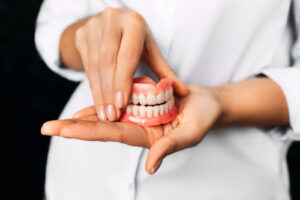Since the beginning of time, dentures have been a dependable replacement for missing teeth, and they still hold a significant place in contemporary dentistry. For people who have lost some or all of their natural teeth, these removable dental appliances give the appearance of a complete set of teeth and enhance oral health and general quality of life.

Types of Dentures
1. Complete dentures are used when a person is missing every one of their natural teeth. There are two varieties of complete dentures:
2. Conventional Dentures: These are created after all remaining teeth have been extracted and the gums have healed, which can take several months.
3. Immediate dentures: These are ready-made prosthetics that can be put on immediately after a tooth extraction. While the patient waits for their traditional dentures, they offer a temporary fix.
4. Partial Dentures: Partial dentures are used when some natural teeth are still present. They close the spaces left by missing teeth, enhancing appearance and functionality. Typically, clasps that attach to nearby healthy teeth keep partial dentures in place.
5. Implant-Supported Dentures: These are fixed to dental implants surgically inserted into the jawbone. Compared to conventional dentures, they offer a more stable and secure fit, enabling better chewing and speaking.
Benefits of Dentures
- Improved Appearance: Dentures restore a natural-looking smile, enhancing facial aesthetics and boosting self-confidence.
- Improved Chewing and Speaking: Missing teeth can make it difficult to eat and speak. People with dentures can communicate clearly and eat a wider variety of foods.
- Support for Facial Muscles: Dentures assist in preserving the structure of facial muscles, preventing the sunken appearance that can result from tooth loss.
- Affordability: Dentures are frequently more affordable than dental implants for replacing missing teeth.
Caring for Your Dentures
To ensure the durability and functionality of your dentures, proper maintenance is crucial:
1. Cleaning – Use a soft-bristle brush and a denture cleaner or gentle soap to brush your dentures daily. Avoid using regular toothpaste because it can be abrasive and harm the denture material.
2. Handle with caution – Dentures are delicate. To avoid breakage if dropped, clean or handle them with a soft towel or a water bowl.
3. Regular Checkups – Go to the dentist for routine checkups. They can check for any underlying issues and adjust and refit your dentures.
4. Soak Overnight – Most dentures must stay moist to keep their shape. Overnight, soak them in water or a denture-soaking solution.
5. Don’t Use Hot Water – Hot or boiling water to clean your dentures can warp them.
6. Appropriate Storage – To keep your dentures from drying out when not in use, store them in a plastic container with water.
Regaining Confidence in Your Smile
For those who lack teeth, dentures provide a dependable and affordable solution. They enhance oral health and restore the appearance of a natural smile, enabling people to live more fully. If you’re considering getting dentures, talk to your dentist about which model would be best for you. Dentures can give you years of comfort and confidence with the right upkeep, allowing you to smile more easily.